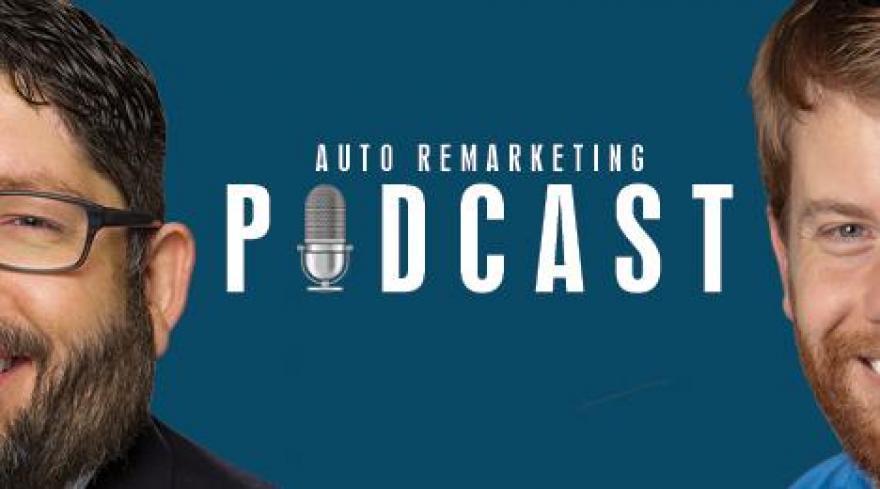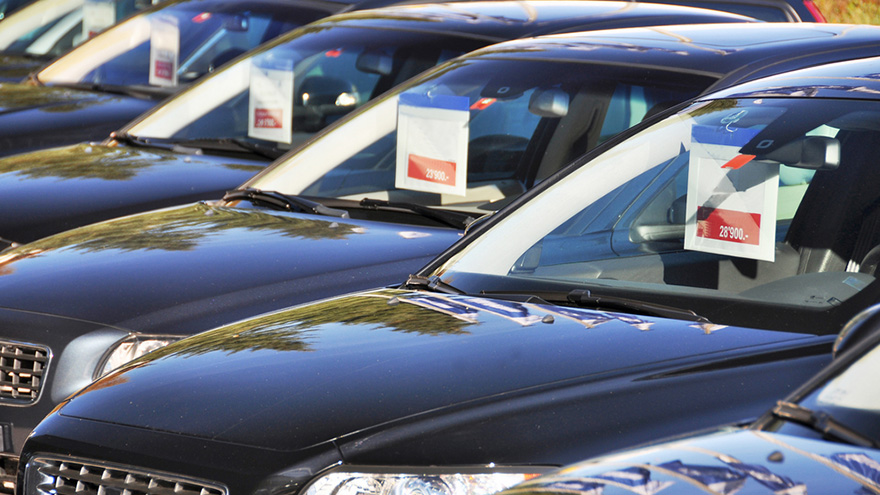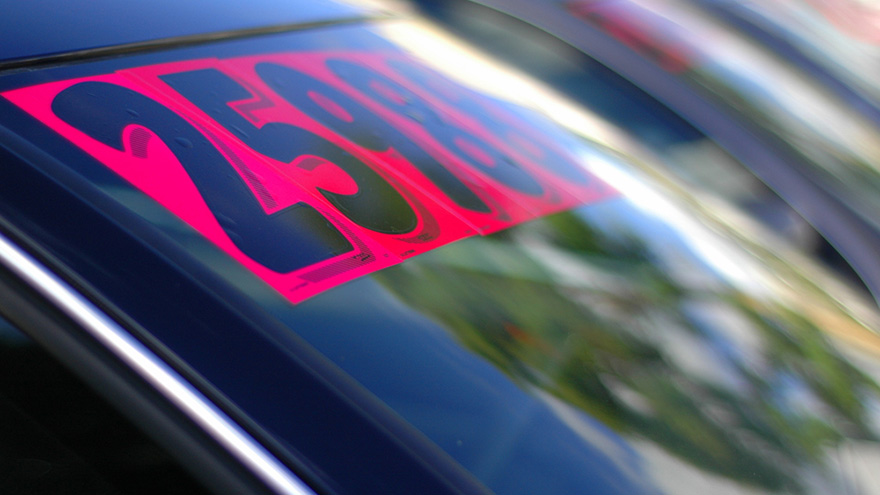A new report from eLEND Solutions asks the question: Is digital retailing promising more than it can deliver? And Nick posed more questions to eLEND Solutions chief executive officer Pete MacInnis about this report and more for this Auto Remarketing Podcast episode recorded during NADA Show 2019.
MacInnis explained during the conversation that although digital retailing and its many definitions is being touted as the future of automotive retailing, this dealership survey indicated that a key hurdle remains. That challenge is many standalone digital retailing tools or platforms quoting inaccurate and/or misleading payment information to consumers, which are ultimately creating more skepticism with buyers and expensive rewrites and unwinds for dealers.
According to the survey, dealers who adopt digital retailing tools are striving to deliver a frictionless buying experience, including more transparency about the “deal,” but these same surveyed dealers report that basic payment calculator estimator tools are actually getting in the way of their desire to evolve.
In fact, a total of 87 percent of dealer respondents agree that it’s common for payment estimator tools to provide inaccurate or unrealistic payment expectations. And it is impacting sales, as 74 percent reported that well over a quarter of deals that include digital retailing-provided payment terms have to be rewritten
And the majority lose more than 60 percent of those sales, according to the survey that’s available here.
MacInnis offered an array of suggestion to reverse these trends during the podcast that can be found below.
Download and subscribe to the Auto Remarketing Podcast on iTunes or on Google Play.
You can also listen to the latest episode in the window below.
Catch the latest episodes on the Auto Remarketing Podcast homepage and on our Soundcloud page.
AutoNation Honda Hollywood has taken many steps to lower its energy costs and reduce its environmental impact in the community. Some of those steps include installing energy-efficient lighting and HVAC systems and state-of-the-art LED lighting in the interior and exterior of the dealership.
Because of actions like that, AutoNation Honda Hollywood has been named a 2018 Energy Efficiency Leader. Dealerships that win the annual recognition have shown “exceptional energy performance” compared to other dealerships in their area, based on their energy use per square foot of building space.
AutoNation Honda Hollywood is one of 33 dealerships nationwide to be recognized as a 2018 Energy Efficiency Leader, a new designation for Honda Green Dealer program participants. Honda introduced the Honda Green Dealer recognition to encourage continuous improvement among its Green Dealers and acknowledge their ongoing efforts to conserve energy. Honda analyzes dealerships' energy performance over a calendar year to determine the Energy Efficiency Leaders.
“We’re proud to be recognized as a 2018 Energy Efficiency Leader and join Honda's global effort to preserve and protect the environment,” AutoNation Honda Hollywood general manager Mike Eagle said in a news release.
For Honda’s Green Dealer program, a third-party evaluator conducts environmental audits of participating dealers and recommends strategies to reduce their energy use. Participating dealers across the company’s automotive, power equipment and powersports lines have so far collectively lowered CO2 emissions by more than 59,000 metric tons and saved almost $12.5 million in energy costs. Honda introduced its voluntary Green Dealer Program to its U.S. dealers in the fall of 2011.
Honda has worked for more than three decades to reduce the environmental impact of its North American products, manufacturing and logistics operations, and facilities. The company's North American Environmental Report reports annually on these initiatives.
Honda says expanding its environmental initiatives to its dealer body is the logical next step in the company's effort to reduce waste, energy use and CO2 emissions across its operations and throughout the lifecycle of Honda products, including at the point of sale.
The 2018 Green Dealers are:
Platinum:
—Bradfon Honda
—Kastner Honda
—Rensselaer Honda
—Rossi Honda
—Roswell Honda
—Smith Honda
—Smithtown Acura
—Tony Honda
Gold:
—Brown Honda
—Cities Edge Motorsports
—Crown Acura
—Don Wessel Honda
—Hardin Honda
—Holmes Honda
—Jim Coleman Honda
—Jody Wilkinson Acura
—Marin Acura
—McKibben Powersport Honda
—Vatland Honda
Silver:
—AutoNation Honda Hollywood
—Chad Little Outdoor Power Equipment
—Diamond Honda
—Frank Leta Honda
—Honda of Santa Fe
—Larry Hopkins Honda
—Lester Raines Honda
—McDaniels Acura
—Monarch Honda
—Piedmont Honda
—Scotsco Inc.
—Scott Honda of West Chester
—Tom-N-Jerry’s Boat Center
—Vandergriff Honda
Jim Robertson likes how the social media, intelligent lead response technology and consumer engagement company Digital Air Strike helps with his dealership’s customer satisfaction index score.
“The online review monitoring is always spot on and gives us the ability to review, correct and sometimes even get the customer to change or remove negative reviews,” said Robertson, who is general manager of Brown’s Manassis Kia.
Digital Air Strike is now taking its partnership with Kia a step further, as the automaker named the company a preferred partner to provide social media and reputation management for Kia dealerships for the eighth consecutive year.
Kia notes that in 2011, Digital Air Strike became the first 100-percent automotive-centric social media vendor to support Kia dealerships nationwide, with 100 percent of Digital Air Strike products being co-op eligible by Kia.
Digital Air Strike notes that it has helped more than 5,000 dealerships boost consumer response and conversions in digital and social media environments. It also says it helps dealerships generate measurable ROI. The company adds that it deploys industry-specific mobile apps, software, intelligent messaging and managed service platforms to monitor, engage, improve and manage consumer interactions for businesses in the United States, Canada and 11 additional countries. Digital Air Strike has also worked with seven of the largest automotive manufacturers.
Kia’s more than 755 dealers can now access all of Digital Air Strike’s social media and reputation management tools and technology.
“It’s a privilege to continue our great relationship with Kia Motors America and Kia dealerships nationwide,” Digital Air Strike co-founder and chief executive officer Alexi Venneri said in a news release. “Kia has long been a market leader and among the first to embrace new technology that enhances the ability for dealers to communicate with Kia consumers. We are proud to provide industry-leading social media marketing, reputation management, and response solutions that help Kia dealers engage with their customers and ultimately sell and service more vehicles.”
Kerrigan Advisors tabulated the figures and discovered the dealership buy/sell market recorded another year of tremendous activity in 2018, generating 6.9 percent in growth above the 2017 level and marking the fifth consecutive year of more than 200 transactions.
According to The Blue Sky Report’s Year in Review released this week, analysts indicated 216 transactions closed in 2018, including a record number of multi-dealership transactions. And the report emphasized this five-year streak shows no signs of abating in spite of an anticipated slump in new-vehicle sales and rising interest rates.
Kerrigan Advisors predicted that 2019 will be another robust year for buy/sell moves and valuations.
“The strength of the dealership buy/sell market over the last five years is a testament to the health of the U.S. economy, the financial markets, and most importantly, the auto retail industry. We believe the number of buyers, particularly those backed by professionally managed capital, will increase in 2019,” said Erin Kerrigan, founder and managing director of Kerrigan Advisors.
“Despite rising interest rates and a decline in new-vehicle sales, the average auto dealership remains highly profitable and valuable, continuing to appeal to private dealers who comprised the majority of buyers in 2019,” Kerrigan continued.
In addition to a strong economy and the ongoing consolidation and innovation opportunities in auto retail, among the key factors Kerrigan Advisors cites for a strong buy/sell market in 2019 include:
— A rise in the number of private investors seeking to put capital into auto retail. Year-to-date, Kerrigan Advisors noted the pace of new investors seeking investments in auto retail has risen 59 percent as compared to 2018
— Increased dealership gross profit driven by fixed operations via service and parts
— Dealerships’ historically demonstrated ability to adjust their business model to create new profit opportunities and reduce variable expenses.
“Buyers are looking for higher quality franchises which are more competitive as new-vehicle sales decline,” Kerrigan said. “These franchises tend to have more fixed operations revenue, which commands a gross profit margin nearly ten times higher than new vehicles and are benefitting from the surge of vehicles entering the “sweet spot” of customer pay post-warranty, more than making up for margin losses from a contracting vehicle market.”
Kerrigan Advisors noted that while overall Blue Sky multiple averages are lower due to a decline in lower demand franchises, valuations remain strong, although more stores are trading at average, rather than high, multiples.
Additionally, valuations are being positively influenced by high real estate valuations which are at peak levels and represented the largest portion of a dealership’s value in 2018. Kerrigan Advisors estimated the average dealership’s real estate value at $11.3 million, up 4.9 percent from 2017.
Experts explained this shift in dealership transaction values from blue sky to real estate has reduced the equity requirements of the average transaction, which Kerrigan Advisors believes is one of the reasons buy/sell activity remains so strong.
Domestics continued to show strength in the 2018 buy/sell market, according to the report, exceeding 50 percent for the first time in the last five years.
On the other hand, import luxury franchises’ market share continued to decline, a trend the report said will continue in 2019 as their high multiples will be more difficult to achieve for some buyers.
Also contributing is the sensitivity import luxury franchises have to rising interest rates, because their high valuations typically require more leverage. But, although the larger import segment will also see a decline in 2019, Kerrigan Advisors expects the top import non-luxury franchises, namely Toyota, Honda and Subaru, to grow their buy/sell market share in 2019.
“A key trend for 2019 is that the business model of the franchise will determine buyer demand: as industry sales contract, buyers become more discerning, focusing on high-performing franchises that have attractive, long-term investment characteristics that tend to outperform the industry when sales decline,” Kerrigan Advisors managing director Ryan Kerrigan said.
“Meanwhile, weaker franchises with challenging dealer business models will see lower buyer demand because today’s buyers are not attracted to franchises with poor dealer relations, highly variable incentive programs, less supportive captive finance companies, low sales per dealership and weak fixed operations,” Ryan Kerrigan continued.
The report also identified the following four market trends, which the firm predicts will meaningfully impact the buy/sell market in 2019 and beyond. They include:
— Sellers avoid image upgrades to capitalize on record real estate values.
— Rising interest rates impact blue sky values.
— Franchise business models determine buyer demand.
— Transaction activity increasingly varies by market.
Other key highlights from the full-year report include:
— 216 transactions closed, versus 202 in 2017, resulting in a 6.9-percent increase over 2017.
—Year-to-date, the pace of new investors seeking investments in auto retail has risen 59 percent as compared to 2018.
— The number of multi-dealership transactions reached a record 65 for the full year, a notable 27.5-percent increase over 2017’s level.
— Domestics’ share of the buy/sell market rose again in 2018, exceeding 50 percent for the first time in the last five years.
— Public retailers’ acquisition spending declined in 2018 by 6.6 percent as compared to 2017.
— Private buyers continue to lead industry consolidation, acquiring 93 percent of the franchises sold in 2018, about the same level as 2017.
— Dealership real estate represented the largest portion of a dealership’s value in 2018, exceeding blue sky value by 84.2 percent.
The firm added public companies are undervalued relative to private dealerships. Public blue-sky multiples now average just 5.1 times, only slightly above Kerrigan Advisors’ average blue sky multiples for private dealerships, despite the publics’ liquidity premium.
The Blue Sky Report, published by Kerrigan Advisors, is a quarterly report on dealership M&A activity, as well as franchise values. It includes analysis of all transaction activity for the year and lays out the high, average and low blue-sky multiples for each franchise in luxury and non-luxury segments.
For more details and to preview the entire report, go to this website.
A digital retailing and messaging company has released what it describes as the first reputation enhancement product for dealerships.
ActivEngage has released AcceleRater, which the company says will help dealerships get more customers and increase revenue. It produces more 5-star ratings for dealerships with every review engagement, according to the company, which added that the product helps give dealers more control over ratings, reviews and revenue.
The company says the product targets shoppers who have had a positive experience at any point in the buying process. That strategy can help dealerships generate more and better reviews, the company added, noting that pilot stores have seen a 100-percent increase in positive feedback from customers with every review engagement.
ActivEngage noted that AcceleRater possesses all of the major capabilities of traditional reputation management tools. Those functions include monitoring and responding to reviews, accessing rich data, and launching review request campaigns.
But the traditional tools only offer dealerships a “reactive approach” to customer feedback, ActivEngage president Ted Rubin said in a news release. A reactive approach means dealerships have “little or no control over when and where shoppers leave reviews,” he added.
“AcceleRater works in tandem with reputation management efforts to help dealers gauge customer perception throughout the entire shopping experience and proactively get more reviews,” Rubin said.
ActivEngage vice president of operations Carol Marshall added that millions of interactions have produced billions of dollars for the company’s dealership customers.
“This has helped make ActivEngage an authority in customer experience,” Marshall said. “Always looking to enhance dealer-customer interaction, we saw the untapped potential of customer feedback to help dealers acquire more customers.
"We hear positive remarks from shoppers in many of our conversations. Now that feedback can translate into a better online reputation for our dealers," Marshall went on to say.
Those used vehicles on your front line and highlighted on your store website — especially certified pre-owned models — are going to look even more appealing if a new report from Edmunds is any indication.
Edmunds projected on Wednesday that used-vehicle sales in 2019 are poised to hit the highest level since the recession. In 2018, analysts said 40.2 million used vehicles were sold in the U.S. In 2019, Edmunds is predicting used-vehicle sales could approach 41 million.
Edmunds experts explained that rising vehicle prices and high interest rates are pushing buyers out of the new market, and a record number of lease returns this year will give shoppers more options than ever in the used market.
“Typically, sales of new and used vehicles follow the same pattern — if sales of new vehicles rise or fall, so do sales of used vehicles, and vice versa,” Edmunds senior manager of industry analysis Ivan Drury said in a news release.
“But now we’re seeing new-vehicle sales fall while used rise, indicating the market has reached a flash point,” Drury continued. “New cars are getting so expensive that they’re out of reach for many car shoppers, but there are so many more affordable used vehicles coming off lease that the market is naturally shifting in that direction.”
Edmunds data showed that in 2013, the price gap between new and 3-year-old used vehicles was 56 percent, amounting to more than $11,000 in savings on average. In 2018, that number grew to 62 percent, totaling nearly $14,000 in savings on average.
Edmunds data also revealed that interest rates on new-vehicle financing jumped by 17 percent in 2018, whereas rates for used vehicles have risen at a slower clip, with interest rates increasing by 9 percent in the same period.
Edmunds experts added that these market conditions have never been more favorable for certified pre-owned vehicles, but there’s an opportunity for automakers to better educate vehicle shoppers on the benefits of these programs.
According to Google Trends data, relative search interest for CPO vehicles has steadily increased over the last five years, but the top pages viewed on Edmunds for shoppers of CPO vehicles are “What Are Certified Pre-Owned Vehicles?” and “Certified Pre-Owned Cars Vs. Used Cars With Extended Warranties.”
“Many shoppers are unaware of the benefits of CPO vehicle programs, but given the tough financial conditions in the new market, it’s never been a better time to look into them,” Drury said.
“Between more affordable prices, the assurance of an automaker warranty, and lower interest rates, CPO vehicles give car shoppers a way to enjoy many of the benefits of a new car and minimize many of the risks of buying a used car,” he went on to say.
The Price Gap Between 3-Year-Old Used Vehicle Versus New Model
| Segment |
2013 |
2018 |
Additional
Percentage Savings |
| Subcompact Car |
$5,750 |
$7,519 |
31% |
| Compact Car |
$7,135 |
$7,891 |
11% |
| Midsize Car |
$9,679 |
$10,979 |
13% |
| Large Car |
$14,771 |
$15,623 |
6% |
| Sports Car |
$9,656 |
$15,877 |
64% |
| Subcompact SUV |
$11,423 |
$9,302 |
-19% |
| Compact SUV |
$7,997 |
$9,760 |
22% |
| Midsize SUV |
$13,753 |
$13,924 |
1% |
| Large SUV |
$21,965 |
$24,024 |
9% |
| Midsize Truck |
$7,594 |
$9,341 |
23% |
| Large Truck |
$14,550 |
$15,765 |
8% |
| Minivan |
$11,765 |
$12,154 |
3% |
| Luxury Subcompact Car |
$8,568 |
$13,606 |
59% |
| Luxury Compact Car |
$15,079 |
$19,509 |
29% |
| Luxury Midsize Car |
$19,755 |
$25,991 |
32% |
| Luxury Large Car |
$35,547 |
$45,486 |
28% |
| Luxury Sports Car |
$33,392 |
$37,374 |
12% |
| Luxury Subcompact SUV |
N/A |
$15,252 |
N/A |
| Luxury Compact SUV |
$16,141 |
$18,967 |
18% |
| Luxury Midsize SUV |
$19,711 |
$22,318 |
13% |
| Luxury Large SUV |
$36,049 |
$41,536 |
15% |
| Industry |
$11,398 |
$13,705 |
20% |
Source: Edmunds
RumbleOn is an e-commerce company that uses technology to help dealers and customers buy, sell, trade, or finance pre-owned vehicles through one online location. Expanding its partnership with Manheim into Fontana, Calif., RumbleOn notes that its distribution network from California to Washington, Pennsylvania and down to Florida, now hits all corners of the United States.
That coverage further reduces inbound freight costs without capital expenditures, according to RumbleOn.
The addition of Manheim Southern California gives RumbleOn regional partnerships in 17 markets across the country, including nine Manheim locations. Those markets include:
—Cincinnati
—Nashville, Tenn.
—Dallas
—Orlando, Fla.
—Daytona Beach, Fla.
—San Diego
—Fontana, Calif.
—San Francisco
—Greensboro, N.C.
—Statesville, N.C.
—Spokane, Wash.
—Indianapolis
—Kansas City, Kan.
—West Palm Beach, Fla.
—Madison, Wisc.
—Windsor, Conn.
—Manheim, Pa.
“By adding Fontana to our capital-light distribution network, RumbleOn further taps into one of the largest pre-owned vehicle markets in the country,” RumbleOn founder, chairman and chief executive officer Marshall Chesrown said in a news release.
“As we expand our automotive presence, Manheim’s reputation for being one of the leading reconditioning and end-to-end remarketing companies makes them a great partner for RumbleOn’s growth strategy," Chesrown continued.
Manheim senior vice president of marketplace Patrick Brennan added, “With its strong brand, RumbleOn is an incredibly valuable partner for Manheim, both as a wholesale buyer and a seller.
"Bringing their attractive inventory, 30-day guarantee, and transportation assistance into southern California is a great win for Manheim buyers in an important market for used vehicles," Brennan went on to say.
J.D. Power notes that its new lead-generation tool for dealer websites provides dealers with qualified leads and increases their used-vehicle inventory.
Using the Value My Car tool with the J.D. Power consumer brand, web visitors can learn the value of their vehicle in exchange for their email address, according to the data and analytics company.
J.D. Power launched the tool on Friday.
Here's how it works. Dealers place the tool on their website. Then, when consumers input their vehicle and contact information, they receive an initial value of their vehicle. The tool then encourages the consumer to receive an in-person vehicle appraisal by visiting the dealer.
J.D. Power is offering the dealer-only product for an introductory price of $75 per month. No contract is required.
The new tool “will not only provide a service to a potential customer as a first touch-point but will ensure potential sales opportunities for the dealerships are being tracked,”
“The new tool has two simple objectives: provide dealers with qualified leads and increase their used-car inventory,” J.D. Power vice president of vehicle valuations Jonathan Banks said in a news release.
"This will not only provide a service to a potential customer as a first touch-point but will ensure potential sales opportunities for the dealerships are being tracked.”
More information on the Value My Car trade-in valuation tool is available here.
NADA has conducted its Dealership Workforce Study since 2012, and the association describes the study as an examination of car and truck dealership compensation, benefits, turnover and retention, hours of operation and work schedules. NADA says the study helps dealers “stay ahead of the demographic curve.”
Now, the 2019 Dealership Workforce Study is open for enrollment for car and commercial truck dealerships.
Through dealer feedback, the association has updated the 2019 survey to gain additional insight into pay structure for variable operations positions.
The deadline for dealers to submit their data is May 15, 2019.
NADA member dealerships will receive two complimentary reports for participating, including a custom report with a Workforce Management Scorecard comparing and ranking their dealership against peer-level dealerships in areas such as compensation, retention and turnover. The 2019 Dealership Workforce Study National & Regional Trends in Compensation, Benefits & Retention Report is the second complimentary report.
Participating dealerships will also receive access to the Database Search Tool for up to one year. Through the tool, dealerships will find all the data submitted from past workforce studies, NADA said in a news release.
To participate in the 2019 Dealer Workforce Study, go to the enrollment page. For information, contact Joe Fleming at (703) 448-5891.
Thirty-four percent of service department customers prefer to communicate via text message, but service departments only communicate that way 9 percent of the time. That is according to the J.D. Power 2019 Customer Service Index Study, released on Thursday.
The study shows that satisfaction scores usually increase when car dealership service departments use customers’ preferred methods of communication. But J.D. Power vice president, U.S. automotive retail practice Chris Sutton says service customers want the convenience of technology. Sutton sees no reason why more service departments don’t communicate by text.
“Dealers have easy access to these tools, so they don’t have to reinvent the wheel,” Sutton said in a news release. “Technology not only improves efficiency, but also the more satisfied a customer is with their overall service experience, the more likely they are to return to the dealership for service and to recommend the dealership to friends and family members. Customers now expect technology to enable more efficient interaction with businesses—and that includes dealers.”
For owners and lessees of 1- to 3-year-old vehicles, the study measures satisfaction with service at a franchised dealer or independent service facility for maintenance or repair work. It also ranks the highest-performing U.S. automotive brands, and that is based on the combined scores of different measures of the vehicle owner service experience. These measures are service quality, service initiation, service adviser, service facility and vehicle pick-up.
Satisfaction is 75 points higher (on a 1,000-point scale) among customers who have an all-digital experience compared with one that is all analog. Those customers want to use the internet and communicate with the dealer through text messages, rather than over the phone. If the service adviser uses a tablet, that only further increases satisfaction.
The survey is based on responses from 57,286 owners and lessees of 2016 to 2018 model-year vehicles. It was fielded from October through December 2018.
The study showed even more results proving customers’ preference for communicating through technology. All generations show a preference for internet scheduling rather than over the phone. That is a major shift since 2015, when the industry average preference for these two methods was 20 percent for the internet and 64 percent for the phone. This year, preferences are 28 percent for the Internet and 59 percent for the phone.
Gen Y customers have shifted their preference toward internet scheduling at a faster rate than Boomers. However, every generation except Pre-Boomers has increased its preference for internet scheduling and decreased its preference for phone scheduling during the past five years of the study. J.D. Power defines the generational groups as Pre-Boomers (born before 1946); Boomers (1946-1964); Gen X (1965-1976); Gen Y (1977-1994); and Gen Z (1995-2004).
Other key findings of the 2019 study:
—In-store engagement is important: The percentage of customers who feel their service adviser provides helpful advice is 70 points higher when the adviser was focused on them and their needs during the visit. Other factors boosting a customer’s view of the service adviser’s perceived helpfulness include informing customers about work performed on the vehicle, knowing the vehicle’s service history, keeping them informed of the vehicle’s status, letting them know when the vehicle will be ready before service begins and performing a vehicle walk-around.
—A large percentage of owners are also promoters: The 2018 study introduced Net Promoter Score, which measures customer loyalty and predicts business growth. The score continues to show that many owners are promoters of their vehicle, although the percentage decreases slightly as vehicles age. Customers are asked their likelihood of recommending their vehicle model and are grouped into either the detractor, passive or promoter categories. More than three-quarters of owners are promoters in year one of vehicle ownership; 75 percent are promoters in year two; and 73 percent are promoters in year three. However, when an owner’s vehicle is not fixed right the first time, Net Promoter Score drops about 50 points (on a 100-point scale).
—Independent facility satisfaction gaining ground: Overall satisfaction with services performed by independent facilities has improved 22 points since 2017, compared with a 17-point improvement by franchised dealers. Satisfaction with service quality at independent facilities has improved 23 points since 2017, compared with a 17-point improvement by franchised dealers.
Sutton says the key performance indicators of service are “an important area of opportunity for dealers.” Simple tasks such as completing service right the first time, returning settings to where they were when the customer brought the vehicle in for service and washing the vehicle can affect customers’ perception of service quality, he added.
The survey also showed the highest-ranking brands, and for the first time in the study’s 38-year history, Porsche ranked highest in dealer service satisfaction among luxury brands. Lexus ranks second, followed by Cadillac, Infiniti and Mercedes-Benz.
For the third consecutive year, Buick ranks highest in satisfaction with dealer service among mass market brands. MINI ranks second, followed by Mitsubishi, Chevrolet, GMC and Toyota.
Auto Remarketing recently hosted a free educational webinar with Podium that focused on the possibilities of text messaging at the dealership. The session titled, "7 Ways Text Messaging Will Boost Your Dealership’s Bottom Line," is available here or through the window at the top of the page.












